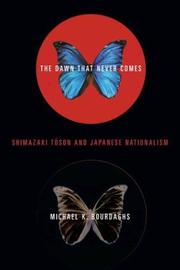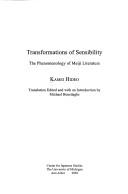| Listing 1 - 10 of 13 | << page >> |
Sort by
|
Book
ISBN: 9780231503419 Year: 2003 Publisher: New York, NY
Abstract | Keywords | Export | Availability | Bookmark
 Loading...
Loading...Choose an application
- Reference Manager
- EndNote
- RefWorks (Direct export to RefWorks)

ISBN: 9780231503419 9780231129800 Year: 2003 Publisher: New York, N.Y. Columbia University Press
Abstract | Keywords | Export | Availability | Bookmark
 Loading...
Loading...Choose an application
- Reference Manager
- EndNote
- RefWorks (Direct export to RefWorks)
Book
ISBN: 1478013699 1478014628 1478021926 Year: 2021 Publisher: Duke University Press
Abstract | Keywords | Export | Availability | Bookmark
 Loading...
Loading...Choose an application
- Reference Manager
- EndNote
- RefWorks (Direct export to RefWorks)

ISBN: 0231129807 1322353115 0231503415 Year: 2003 Publisher: New York Columbia university press
Abstract | Keywords | Export | Availability | Bookmark
 Loading...
Loading...Choose an application
- Reference Manager
- EndNote
- RefWorks (Direct export to RefWorks)
A critical rethinking of theories of national imagination, The Dawn That Never Comes offers the most detailed reading to date in English of one of modern Japan's most influential poets and novelists, Shimazaki Toson (1872-1943). It also reveals how Toson's works influenced the production of a fluid, shifting form of national imagination that has characterized twentieth-century Japan. Analyzing Toson's major works, Michael K. Bourdaghs demonstrates that the construction of national imagination requires a complex interweaving of varied-and sometimes contradictory-figures for imagining the national community. Many scholars have shown, for example, that modern hygiene has functioned in nationalist thought as a method of excluding foreign others as diseased. This study explores the multiple images of illness appearing in Toson's fiction to demonstrate that hygiene employs more than one model of pathology, and it reveals how this multiplicity functioned to produce the combinations of exclusion and assimilation required to sustain a sense of national community. Others have argued that nationalism is inherently ambivalent and self-contradictory; Bourdaghs shows more concretely both how this is so and why it is necessary and provides, in the process, a new way of thinking about national imagination. Individual chapters take up such issues as modern medicine and the discourses of national health; ideologies of the family and its representation in modern literary works; the gendering of the canon of national literature; and the multiple forms of space and time that narratives of national history require.
J5931 --- J5500.70 --- J4122 --- J2284.70 --- Japan: Literature -- modern fiction and prose (1868- ) -- criticism --- Japan: Literature -- history and criticism -- modern, Kindai (1850s- ), bakumatsu, Meiji, Taishō --- Japan: Sociology and anthropology -- nationalism --- Japan: Genealogy and biography -- biographies -- kindai (1850s- ), bakumatsu, meiji, taishō --- Nationalism in literature. --- Shimazaki, Tōson, --- Criticism and interpretation. --- Nationalism in literature --- Shimazaki, Tōson, --- Shimazaki, Haruki, --- Simadzaki-Toson, --- Tōson, --- Simadzaki, Toson, --- Tao-chʻi, Tʻeng-tsʻun, --- 岛崎藤村, --- 島埼藤村, --- 島崎籐村, --- 島崎藤村, --- 島琦藤村, --- Shimazaki, Tōson
Book
ISBN: 0472127489 1929280602 0472901435 9780472127481 9781929280605 Year: 2010 Publisher: Ann Arbor, Michigan : University of Michigan Press,
Abstract | Keywords | Export | Availability | Bookmark
 Loading...
Loading...Choose an application
- Reference Manager
- EndNote
- RefWorks (Direct export to RefWorks)
Linguistics in literature. --- Japanese literature --- History and criticism --- Theory, etc.
Book
ISBN: 9780231158749 0231158742 9780231158756 0231158750 9780231530262 0231530269 1280599006 9786613628831 9781280599002 Year: 2012 Publisher: New York : Columbia University Press,
Abstract | Keywords | Export | Availability | Bookmark
 Loading...
Loading...Choose an application
- Reference Manager
- EndNote
- RefWorks (Direct export to RefWorks)
From the beginning of the American occupation in 1945 to the post-bubble period of the early 1990s, popular music provided Japanese listeners with a much-needed release, channeling their desires, fears, and frustrations over an ever-shifting geopolitical reality into a pleasurable and fluid art. Pop music allowed Japanese artists and audiences to assume various identities, reflecting the country's uncomfortable position under American hegemony. Michael Bourdaghs composes the first English-language study of this phenomenon, considering genres as diverse as boogie-woogie, rockabilly, enka,

ISBN: 1929280122 0472901427 9780472127474 9780472901425 0472127470 Year: 2002 Publisher: Ann Arbor, Michigan : University of Michigan Press,
Abstract | Keywords | Export | Availability | Bookmark
 Loading...
Loading...Choose an application
- Reference Manager
- EndNote
- RefWorks (Direct export to RefWorks)
Japanese literature --- J5500.70 --- J5509 --- J5930 --- History and criticism --- Japan: Literature -- history and criticism -- modern, Kindai (1850s- ), bakumatsu, Meiji, Taishō --- Japan: Literature -- theory, methodology and philosophy --- Japan: Literature -- modern fiction and prose (1868- ) --- History and criticism.
Book
ISBN: 0472127470 Year: 2002 Publisher: Ann Arbor, Michigan : University of Michigan Press,
Abstract | Keywords | Export | Availability | Bookmark
 Loading...
Loading...Choose an application
- Reference Manager
- EndNote
- RefWorks (Direct export to RefWorks)
Book
ISBN: 9781929280605 Year: 2010 Publisher: Ann Arbor Center for Japanese studies. University of Michigan
Abstract | Keywords | Export | Availability | Bookmark
 Loading...
Loading...Choose an application
- Reference Manager
- EndNote
- RefWorks (Direct export to RefWorks)
Digital
ISBN: 9780822376682 Year: 2014 Publisher: Durham Duke University Press
Abstract | Keywords | Export | Availability | Bookmark
 Loading...
Loading...Choose an application
- Reference Manager
- EndNote
- RefWorks (Direct export to RefWorks)
In this major, paradigm-shifting work, Kojin Karatani systematically re-reads Marx's version of world history, shifting the focus of critique from modes of production to modes of exchange. Karatani seeks to understand both Capital-Nation-State, the interlocking system that is the dominant form of modern global society, and the possibilities for superseding it. In The Structure of World History, he traces different modes of exchange, including the pooling of resources that characterizes nomadic tribes, the gift exchange systems developed after the adoption of fixed-settlement agriculture, the exchange of obedience for protection that arises with the emergence of the state, the commodity exchanges that characterize capitalism, and, finally, a future mode of exchange based on the return of gift exchange, albeit modified for the contemporary moment. He argues that this final stage—marking the overcoming of capital, nation, and state—is best understood in light of Kant's writings on eternal peace. The Structure of World History is in many ways the capstone of Karatani's brilliant career, yet it also signals new directions in his thought.
| Listing 1 - 10 of 13 | << page >> |
Sort by
|

 Search
Search Feedback
Feedback About UniCat
About UniCat  Help
Help News
News